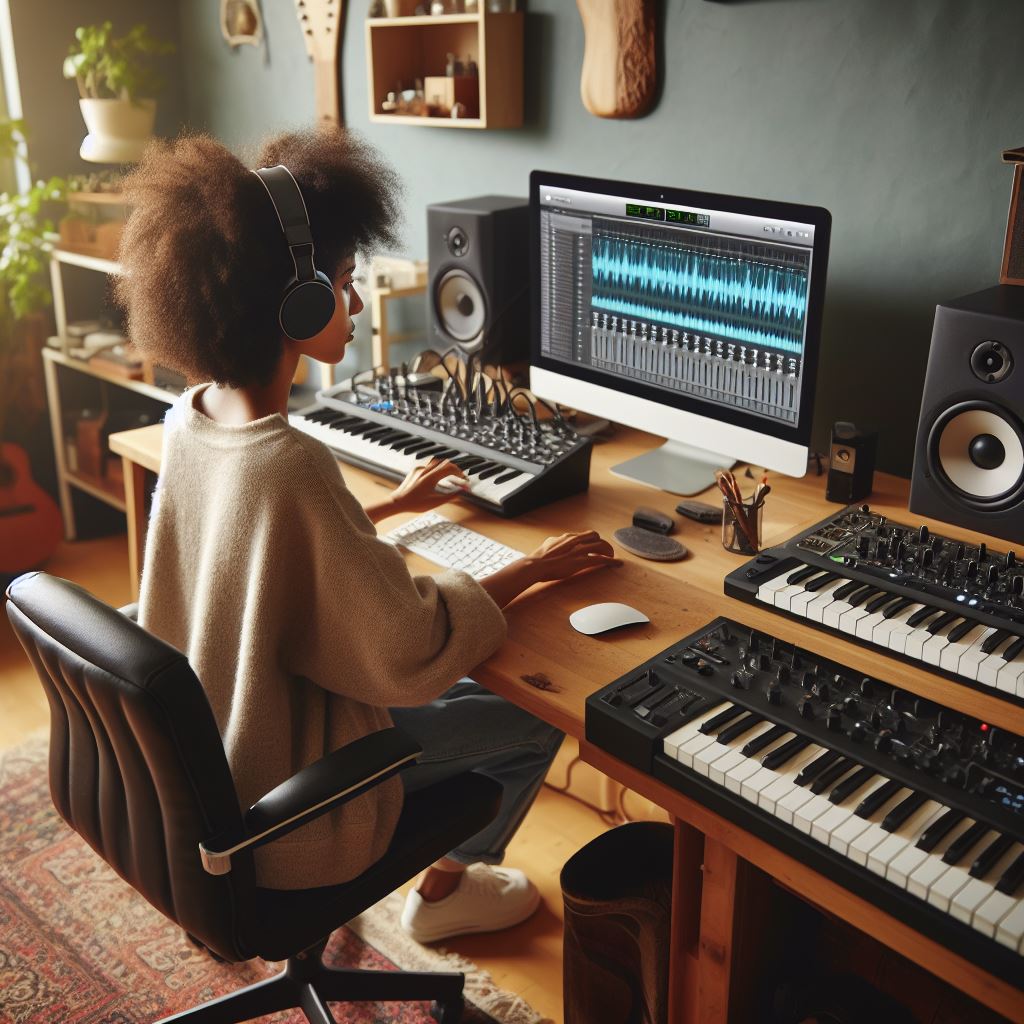Introduction
Importance of music contracts
Music contracts play a crucial role in the UK music industry, safeguarding various parties’ interests, including artists, record labels, producers, and songwriters.
These agreements outline the terms and conditions of collaborations, licensing, distribution, and other vital aspects of the music business.
UK music industry’s significance
The UK music industry has an illustrious history, with iconic labels such as EMI, Sony Music, and Universal Music originating from there.
It has given birth to legendary artists like The Beatles, Adele, and Queen, contributing immensely to the global music culture.
Understanding the importance of music contracts is vital for artists and industry professionals.
Contracts ensure the protection of intellectual property rights, establish ownership of music compositions, and enable royalty payments.
They also define revenue sharing, tour agreements, and licensing arrangements with streaming platforms, radio stations, and other media outlets.
Navigating music contracts effectively requires legal knowledge or professional guidance.
Artists should consult music lawyers or industry experts to negotiate fair terms and avoid potential pitfalls.
It is crucial to carefully review the contract’s scope, exclusivity, and duration, as well as thoroughly understand the financial aspects and possible termination clauses.
Basically, music contracts form the backbone of the UK music industry, providing stability and transparency for all stakeholders involved.
Artists and aspiring professionals must recognize their significance and seek proper guidance to navigate these contracts successfully.
By doing so, they can protect their rights and interests while thriving in the vibrant and ever-evolving UK music scene.
Understanding Music Contracts in the UK
Definition and purpose of music contracts
A music contract is a legally binding agreement between parties involved in the music industry.
These contracts serve the purpose of outlining the terms and conditions of a professional relationship.
Personalized UK Career Consulting
Receive tailored career guidance designed just for you. Get actionable steps and expert support to boost your career in 1-3 days. Take control of your career now.
Get StartedCommon types of music contracts in the UK
Common types of music contracts in the UK include record deals, publishing agreements, and management contracts.
Record deals involve an agreement between an artist and a record label for the production and distribution of music.
Publishing agreements establish the rights and royalties associated with the use of an artist’s music.
Management contracts are entered into between an artist and a manager who handles their career and business affairs.
Legal advice is crucial when navigating music contracts in the UK due to the complexity of the music industry.
An experienced music lawyer can provide guidance on contract terms, ensuring fair deals for all parties involved.
Importance of legal advice while navigating music contracts
Legal advice helps to ensure that contracts are legally binding and protect the rights and interests of the parties.
It is essential to understand the fine print of music contracts to avoid any misunderstandings or disputes in the future.
One of the main benefits of legal advice is the protection of intellectual property rights for musicians.
Music contracts define how copyright, royalties, and licensing will be managed and distributed.
Legal professionals can help navigate the complexities of copyright law and ensure artists receive fair compensation.
Signing a contract without legal advice can lead to unfavorable terms or exploitation by industry professionals.
Music contracts often involve negotiations between parties, and legal advice can ensure a fair and balanced agreement.
In addition to providing legal guidance, music lawyers can offer industry-specific insights and advice.
Your Dream Job Starts with a Perfect CV
Get a tailored CV and cover letter that captures your unique strengths and stands out in your industry. Let us help you make an unforgettable first impression.
Get StartedThey may have knowledge of industry norms and practices that can be advantageous during contract negotiations.
When seeking legal advice, it is important to find a lawyer with experience in music law and the UK music industry.
Referrals from industry professionals or organizations can help in finding the right legal representation.
Generally, understanding the definition, purpose, and types of music contracts in the UK is essential for artists.
Seeking legal advice during contract negotiations is crucial to protect an artist’s rights and interests.
A knowledgeable music lawyer can provide guidance and help navigate the complexities of the music industry.
Navigating music contracts in the UK is a process that requires careful consideration and professional assistance.
Read: Music Education: Is It Vital in the UK?
Key Elements of Music Contracts
A music contract is a legally binding agreement that outlines the rights and obligations of parties involved in the music industry.
It is crucial for artists, producers, and other stakeholders to understand the key elements of music contracts in the UK.
Let’s take a closer look at these elements:
Parties involved in a music contract
- The contract should clearly identify and define the parties involved, such as the artist(s), producer(s), label(s), and other relevant entities.
- Each party’s obligations and responsibilities should be clearly outlined to avoid any confusion or disputes.
Contract length and renewal terms
- The duration of the contract should be specified, indicating the start and end dates of the agreement.
- Potential renewal terms and conditions should be addressed, allowing parties to negotiate new contracts or terminate existing ones.
Copyright ownership and licensing rights
- The contract should specify who retains ownership of the copyright in the music, lyrics, and any other creative works involved.
- Licensing rights, such as the right to reproduce, distribute, perform, or display the music, should be clearly stated.
Royalty rates and payment terms
- The contract should outline the agreed-upon royalty rates, which determine the percentage of income that will be paid to the artist or other rights holders.
- Payment terms, such as the frequency and method of payment, should be clearly stated to ensure timely and fair compensation.
Performance and distribution rights
- Performance rights, including live performances and broadcasting, should be addressed in the contract.
- Distribution rights, such as the right to release and distribute the music across various platforms, should also be specified.
Termination and dispute resolution clauses
- The contract should include provisions for termination, specifying the conditions under which either party can end the agreement.
- Dispute resolution clauses should outline the procedures for resolving any disagreements, such as through mediation, arbitration, or litigation.
Understanding these key elements is essential for navigating music contracts in the UK.
Both parties should carefully review and negotiate the terms to ensure their rights are protected and they receive fair compensation for their work.
By having a clear understanding of the elements and seeking legal advice if necessary, artists and other stakeholders can establish contracts that promote success and protect their interests in the dynamic music industry.
Optimize Your LinkedIn for Success
Boost your LinkedIn profile with a professional bio, keyword-rich headline, and strategic recommendations that attract recruiters. Stand out from the crowd and get noticed.
Optimize NowRead: Breaking into Classical Music in the UK
Negotiating Music Contracts in the UK
Importance of thorough research and understanding before negotiation
- Before entering into any negotiation, it is essential for musicians to conduct thorough research.
- Understanding the terms and conditions of a music contract is crucial for successful negotiations.
- By researching the market and understanding industry standards, artists can negotiate better deals.
- Artists should also research the reputation and track record of the party they are negotiating with.
Consulting with legal experts and industry professionals
- Before negotiation, musicians should seek the advice of legal experts who specialize in music contracts.
- A music lawyer can provide guidance and ensure that artists’ interests are protected in the negotiation.
- Consulting with industry professionals such as managers or agents can also be beneficial.
- These professionals can provide valuable insights and help artists navigate the negotiation process.
Strategies for successful contract negotiation
- Artists should always aim to negotiate from a position of strength and have alternative options.
- Setting clear goals and determining non-negotiable terms can help artists stay focused during negotiation.
- It is crucial for musicians to be prepared to walk away if the terms are not favorable.
- Open and honest communication is essential in building a mutually beneficial contract.
Common pitfalls to avoid during negotiation
- One common pitfall is signing a contract without fully understanding its contents.
- Musicians should never be pressured into signing a contract before they are ready.
- Another pitfall is succumbing to the temptation of accepting unfavorable terms due to financial pressure.
- Artists should always consult with experts and take the time to review and negotiate the contract.
Negotiating music contracts in the UK requires careful preparation, expert advice, and strategic thinking.
Thorough research and understanding of the contract terms and conditions are vital for successful negotiations.
Consulting with legal experts and industry professionals can provide valuable insights and guidance.
Strategies like setting clear goals, maintaining a position of strength, and effective communication can lead to favorable outcomes.
Avoiding common pitfalls such as signing contracts without understanding them or succumbing to pressure is crucial.
By following these guidelines, musicians can navigate the complex world of music contracts in the UK with confidence and ensure fair and beneficial agreements for their careers.
Read: Grassroots Venues: UK Musicians’ Haven

Ensuring Fairness and Protecting Rights
Overview of UK laws and regulations related to music contracts
- The UK has various laws, such as the Copyright, Designs, and Patents Act, that protect creators and their works.
- Artists should familiarize themselves with contract laws, including the Contracts (Rights of Third Parties) Act, to understand their rights.
- Music contracts in the UK must comply with general contract law principles, ensuring fairness and transparency.
- The UK government also established organizations like PRS for Music to protect the rights of musicians.
Importance of seeking legal advice to ensure fairness
- Consulting a music attorney or solicitor before signing a contract is crucial to understand its terms and implications.
- Legal experts can identify potential pitfalls, negotiate on the artist’s behalf, and help secure fair compensation.
- They have extensive knowledge of industry practices, enabling artists to make informed decisions and safeguard their interests.
- Avoiding legal advice may result in exploitative contracts that restrict an artist’s creative and financial freedom.
Protecting intellectual property rights through contracts
- Music contracts should include provisions regarding the ownership and use of intellectual property, including songs and recordings.
- Artists should negotiate for exclusive rights to their work, ensuring they retain control and receive proper royalties.
- The contract should clearly specify how intellectual property will be exploited, distributed, and licensed.
- Failing to protect intellectual property rights may result in unauthorized use, financial loss, or disputes.
Understanding the power dynamics within the music industry
- The music industry often involves imbalanced power dynamics between artists, record labels, and other industry stakeholders.
- Artists, especially emerging ones, may face pressure to sign unfavorable contracts to secure opportunities.
- Understanding the industry’s structure and dynamics helps artists navigate negotiations and achieve fair agreements.
- Transparency, professional representation, and industry knowledge empower artists to advocate for their rights.
By being aware of UK laws and regulations, seeking legal advice, protecting intellectual property rights, and understanding industry dynamics, musicians can navigate music contracts with confidence, ensuring fairness and protecting their rights.
Read: Social Media for Musicians in the UK: Tips
Key Considerations for Independent Artists
Challenges faced by independent musicians in navigating contracts
- Limited resources and industry knowledge make navigating contracts challenging for independent artists.
- Lack of legal representation can result in unfair terms and exploitation.
- Understanding complex terminology and clauses in contracts is difficult without professional guidance.
- Independent artists often face pressure to sign unfavorable contracts due to financial constraints.
- Negotiating contracts with record labels or promoters can be intimidating and overwhelming.
Importance of seeking representation or joining professional organizations
- Seeking legal representation is crucial to protect the rights and interests of independent artists.
- Lawyers or music industry professionals can provide valuable advice and negotiate contracts on artists’ behalf.
- Joining professional organizations like the Musicians’ Union can offer support, resources, and access to legal assistance.
- Professional organizations can help independent artists navigate contractual obligations and provide networking opportunities.
- Through professional representation and organizational support, independent artists can level the playing field.
Strategies for protecting rights and negotiating beneficial terms
- Educate yourself on the basics of music contracts, including copyright ownership and royalty structures.
- Consult with a lawyer who specializes in music law to review and negotiate contracts.
- Clarify and negotiate important terms such as distribution rights, tour support, and merchandising.
- Seek professional advice on licensing, publishing, and synchronization rights to maximize revenue streams.
- Consider alternative contract options such as licensing deals or distribution agreements instead of traditional record deals.
- Establish clear expectations and responsibilities for both parties involved in the contract.
- Protect your intellectual property by registering your work with appropriate copyright agencies.
- Prioritize fair compensation, royalty rates, and the ownership of master recordings.
- Build a strong network of connections within the music industry to enhance negotiating power.
- Regularly review and update your contracts as your career progresses to ensure they reflect your current needs and goals.
By understanding the challenges faced by independent artists in navigating music contracts and the importance of seeking representation or joining professional organizations, musicians can protect their rights and negotiate beneficial terms.
By implementing strategies such as educating themselves, consulting with music lawyers, and clarifying important terms, independent artists can ensure fair treatment and maximize their chances of success in the music industry.
It is essential for artists to stay informed, proactive, and assertive in order to navigate the complex world of music contracts effectively.
Conclusion
Comprehending music contracts in the UK is of utmost importance.
These contracts govern various aspects of an artist’s career, including rights, royalties, and obligations.
By understanding these contracts, musicians can protect their interests, avoid pitfalls, and secure fair compensation for their work.
It is highly encouraged that musicians prioritize legal protection.
Engaging the services of a professional music attorney can provide invaluable guidance throughout the contract negotiation and signing process.
This ensures that artists enter into agreements that best serve their interests and safeguard their rights.
The complexities within the UK music industry should not discourage musicians, but rather motivate them to explore the opportunities available.
Despite the challenges, the UK music scene offers a wealth of potential for growth, exposure, and artistic development.
In a nutshell, by understanding music contracts, seeking legal protection, and embracing the complexities and opportunities of the UK music industry, musicians can navigate their careers with confidence and maximize their chances of success.
[E-Book for Sale]
500 Cutting-Edge Tech Startup Ideas for 2024 & 2025: Innovate, Create, Dominate
$19.99 • 500 Tech Startup Ideas • 62 pages
You will get inspired with 500 innovative tech startup ideas for 2024 and 2025, complete with concise descriptions to help you kickstart your entrepreneurial journey in AI, Blockchain, IoT, Fintech, and AR/VR.




